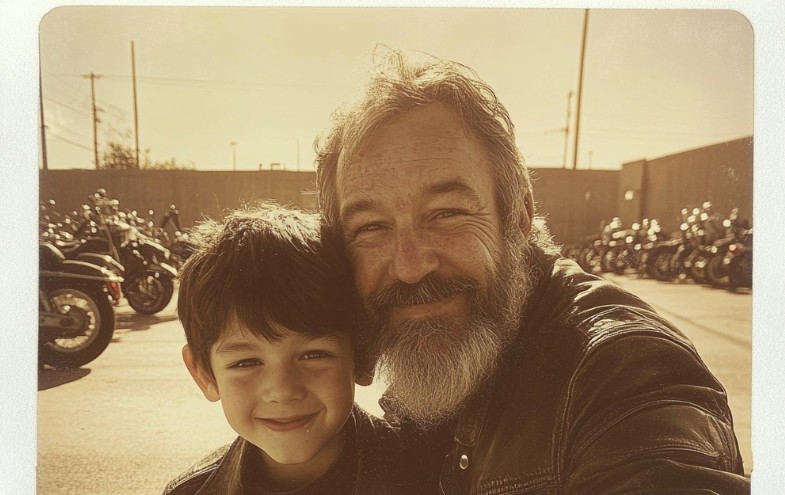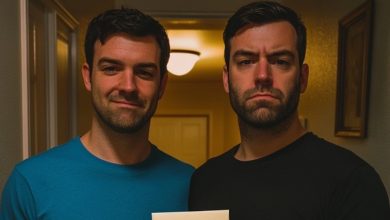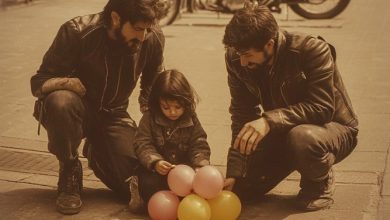My mother-in-law phoned the cops on me for picking up my own son on my motorbike.

My name is Greg Hoffman, and this is the real story of how my mother-in-law tried to paint me as a kidnapper simply because I ride a motorcycle. I have been on two wheels for more than three decades, served two tours overseas, and worked as a certified public accountant for years. I have also been Kevin’s dad for eight wonderful years. Never once have I put my son in harm’s way. Still, to my wife’s mother, one look at my leather jacket is proof that I must be dangerous.
It began with off-hand remarks
Helen—my mother-in-law—never liked motorcycles. At first her dislike was no more than a few rude remarks over Sunday dinners. “People who ride those things are always in trouble,” she would mutter, loud enough for everyone to hear. If I mentioned a charity ride for veterans, she would wrinkle her nose and ask, “Is that safe for the community?”
I brushed it off. Some folks fear what they do not understand. My wife, Laura, often excused her mother’s tone. “She’s just old-fashioned,” Laura said. “Try not to take it personally.” I tried, for Laura’s sake.
Yet I could sense Helen pushing Kevin away from me a little more each week. If I arrived wearing my riding vest, she would pull him onto her lap, as if leather patches carried germs. I caught Kevin staring at me once, confusion in his eyes. Children notice far more than adults admit.
The birthday that turned ugly
Three months before everything exploded, Kevin turned eight. Helen insisted on hosting the party at her house. I offered no argument; I only asked for the start time.
“You’re not bringing that thing,” she said when I called to confirm. Helen never uses the word “motorcycle,” only “that thing,” dripping with disgust.
“Fine.” I promised to drive the truck.
“And don’t show up in costume,” she added. By “costume” she meant my vest with an American flag patch and the logo of the Iron Patriots Riding Club—a group of mostly veterans who raise money for hospitals, food banks, and scholarship funds.
I arrived wearing a polo shirt and khakis, the same as every other suburban dad there. Still, Helen whispered to the parents. “You know he used to ride with a gang,” she told them, which was a lie. The Iron Patriots are not a gang, and anyone who met our members—folks with calloused hands and Purple Hearts—could see that in a heartbeat.
At cake time I watched Kevin glow beneath the candles while a half-circle of grown-ups stared at me like I might bolt with their wallets. Laura pretended not to notice. Helen looked pleased. That night, Kevin asked, “Daddy, are you in a gang?”
“No, buddy,” I answered. “I ride with a club of veterans. We do charity work.”
“Grandma says bikes are for bad people who don’t have real jobs.”
I swallowed hard. “Grandma is wrong this time. A motorcycle is just a machine. Good people and bad people both drive cars, ride bicycles, and use motorcycles. What matters is the person, not the machine.”
Gathering evidence
From that night forward I wrote everything down: every bitter comment Helen made, every time she yanked Kevin away, every rumor she spread. Something told me I might need proof one day. Sadly, I was right.
Two weeks before the worst day, Kevin and I spent a sunny afternoon at the park. We climbed the jungle gym, ate ice cream, and raced pinecones in the creek. When I pulled into our driveway, Helen’s sedan sat there like a crocodile in a watering hole.
“Where were you?” she demanded.
“The park. Laura knew.”
“Can anyone verify that?” She said “verify” the way a detective might ask a suspect for an alibi.
“Why would I need an alibi for taking my son outside?”
“You never know with your type,” she said, voice rising so the neighbors could hear. “Children disappear all the time.”
Laura stood in the doorway, lip bitten, eyes on the ground. She never stepped in when Helen turned cruel. Kevin, clutching his pinecone prize, watched the grown-ups argue.
That night I added “insinuated kidnapping at park” to my file.
The school parking-lot disaster
On a Wednesday morning the school nurse phoned: Kevin had forgotten his inhaler again. Laura was stuck at work, so I zipped over on my Harley—it cuts through traffic faster than my pickup and lets me park close to the entrance.
I signed the visitor sheet, like always. I chatted with the office staff, like always. Then I heard shouting outside.
Helen stood in the lot, cell phone held high, screaming about a “dangerous biker” trying to snatch her grandson. Parents stopped. Phones came out. A crowd formed around my motorcycle.
By the time I reached her, sirens wailed. Two squad cars rolled in, lights flashing. The officers approached me with tense shoulders and cautious hands.
“Sir, step away from the vehicle, keep your hands where we can see them.”
“Helen,” I said as calmly as I could, “tell them who I am.”
She pointed at my beard and jacket. “That’s him! He tried to lure Kevin out of class!”
The principal hurried outside with my driver’s license, Kevin’s birth certificate, and a stack of school forms showing me listed as father, emergency contact, and pickup guardian. Still, the officers checked everything twice. Twenty minutes later they admitted no crime had occurred.
Kevin arrived in time to see me questioned. Tears streaked his cheeks. “Why do they think Daddy is bad?” he sobbed. The scene stamped fear into him that words could not erase.
Helen stood to one side, satisfied. She muttered about calling child services next.
The fallout at home
That night, after Kevin fell asleep exhausted from crying, Laura and I argued.
“Your mother tried to have me arrested where our son studies,” I said. “You said nothing.”
“She was worried,” Laura replied. “You know how Mom is.”
“Yes, I do know. She hates bikes, and she hates that I ride one. That does not give her the right to lie to police.”
“If you would drive the truck like a normal father—”
I stared at her. “I fought in wars so people could enjoy freedom. Does that ‘normal’ count for nothing?”
She folded her arms. “I’m tired of people whispering. Of the looks at school, the questions at work. Maybe Kevin is safer without the bike.”
The next words slipped out before I could stop them: “Maybe you and your mother should decide if you love me or the idea of me.”
The silence that followed felt final.
The line in the sand
Laura left a day later with Kevin “to give everyone space.” I spent two days compiling every note, text, and audio clip for my lawyer: Helen urging Kevin not to trust me, telling neighbors that bikers peddle drugs, lying about criminal records. I also gathered letters from colleagues, coaches, and parents who knew me well.
On Saturday I received a message from Laura: “Mom thinks it’s better if you skip Kevin’s soccer game. Parents are uneasy after what happened.”
My stomach sank. Coaching Kevin’s team had been our father-son highlight for two years. Now, in one blow, I was an outsider. Helen’s plan was working—unless I fought back.
Brothers on wheels
When people hear the word “biker,” they imagine roaring engines and bar fights. The Iron Patriots are something else entirely. Tank, a pediatric surgeon with a prosthetic leg, texted first: “Need a hand, brother?” Diesel, a fellow accountant, wrote: “You’re not alone. Let’s show them who we really are.”
That week we organized Community Service Day. Fifty riders rolled into town—but not to scare anyone. We picked up trash at the veterans’ memorial, delivered meals to shut-ins, and ran a free safety class teaching kids about helmets, reflective gear, and road awareness. Local news cameras arrived. Tank, standing beside me, told the reporter, “Greg was called a criminal for riding a bike. We’re here to prove bikes don’t make bad people—choices do.”
Footage of Helen’s school outburst had already circulated online. Now viewers saw the fuller picture: a grandmother driven by hate, and a father backed by a community of helpers. Messages of support poured in. Parents who had looked at me with fear apologized. The principal invited me to return as a volunteer if I wished.
Divorce and the courtroom battle
But at home, walls stayed cold. Laura filed for divorce, claiming my “lifestyle” endangered Kevin. Her lawyer cited accident statistics and news stories about outlaw clubs.
My lawyer countered with facts: my spotless record, my safety courses, photos of Kevin in a child-approved helmet, letters from teachers praising my involvement. Then we played the recordings—Helen telling Kevin that bikers steal children, that his dad would “die in a crash and leave him alone,” that real men drive SUVs. The judge’s eyebrows rose higher with each clip.
Eight-year-old Kevin asked to speak privately with the judge and a child advocate. When he came out, tears glistened in his eyes, but his chin was high.
“Grandma lies about Daddy,” he said later. “She says leather means you’re bad. But Daddy helps people.”
The court granted me primary custody. Laura received weekend visits; Helen’s time with Kevin would be supervised by a counselor until she completed training on parental alienation.
A new chapter on two wheels
The first weekend Kevin stayed with me after the ruling, he padded into the garage wearing his little riding jacket—the one Helen hated.
“Can we ride to the memorial and plant flowers?” he asked.
I knelt, buckled his helmet, and whispered, “Only if you promise to tell me the second you feel scared.”
He grinned. “I feel safe with you, Dad.”
We rode together under the morning sun. At the memorial, Tank and other riders waved, their bikes lined up like metallic guardians. Kevin helped place fresh soil around new flowers. He listened to stories of buddies lost overseas and kids saved by charity rides.
Half an hour later, Helen’s sedan crept past the edge of the lot. She slowed, staring at the scene—Kevin laughing among so-called “dangerous bikers,” Tank adjusting his prosthetic, Diesel showing Kevin how to polish a chrome fender. Helen did not stop. She pressed the gas and drove away.
Kevin saw her. He waved, smile bright, dirt smudged on his cheeks. She kept driving.
Lessons learned
Prejudice builds walls; truth tears them down. Helen’s hatred cost her more than she ever predicted—her daughter’s marriage, her reputation, and most of all, her grandson’s trust. Laura and I share Kevin on peaceful terms now, though sadness lingers in her eyes when she drops him off. She chose image over understanding, and some choices cannot be undone.
Kevin, however, is thriving. He knows bikes rumble and leather creaks, but those sounds mean family, freedom, and acts of kindness done without cameras—unless the news shows up again. He understands that judging by clothes or vehicles is lazy; character lives deeper.
Sometimes, when road and sky meet in a blue line ahead, Kevin taps my shoulder. I pull over, and we talk about big things—bravery, honesty, second chances. He tells me he might ride his own motorcycle one day. I tell him I will teach him every safety rule in the book.
And if someone ever calls him dangerous because of the machine beneath him, I hope he remembers his father’s story—how a beard and a bike could not hide the truth forever, how love stayed upright even when lies tried to lay it down.
Because a real father does not just give his child a helmet; he gives him the wisdom to see past prejudice, the strength to stand tall in storms, and the courage to ride his own road—no matter who tries to block the way.



